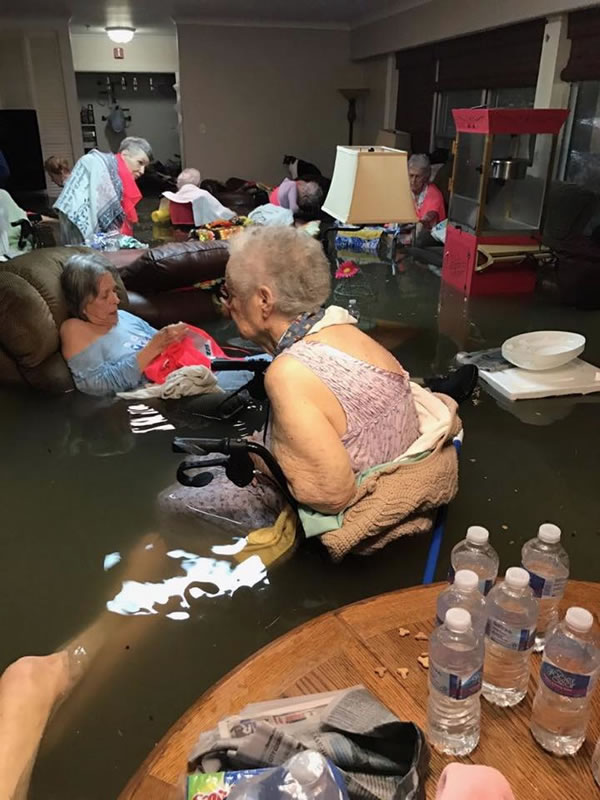
The scene at La Vita Bella Nursing Home, Dickerson, Texas, yesterday. They were rescued yesterday.
By now, you’ve probably heard the news reports and seen the photos coming from Houston, Texas in the wake of Hurricane Harvey, and you might be asking “What can I do to help?”. Here are some suggestions:
If you don’t live in the area, send money, not stuff.

Money has these advantages over stuff:
- You can send it instantly — there’s no transport time for money.
- There are no transport costs for money, either.
- It lets local assistance acquire the stuff they need.
- It lets aid group spend more time providing aid and less time managing incoming stuff.
Here’s a short (and most certainly incomplete) list of places where you can donate:
- Americares, who are delivering relief supplies and working with a clinic in Houston. They get full marks from Charity Navigator.
- All Hands is coordinating with emergency management officials about assisting in the response and recovery. They get full marks from Charity Navigator.
- Global Giving is an international organization that works with local charities and organizations when disasters strike. They get full marks from Charity Navigator.
- The Texas Diaper Bank is assembling relief kits for families with babies and small children who need clean diapers amidst the flooding and evacuations. As Texas Monthly puts it, “Diapers take up a lot of space in a delivery truck, which means that other relief organizations have to decide between bringing diapers or food to affected areas. The Texas Diaper Bank fills in that need.”
- Driscoll Children’s Hospital serves a large area, and people from many affected parts of the coast are likely to need their services.
- Portlight helps displaced residents with disabilities or who need special care.
- Direct Relief USA offers prescription drugs and other medical supplies to those who need it in emergency situations, and works with clinics and primary care doctors to ensure that people are able to get what they need when they need it.
- United Way of Greater Houston are also taking donations, and they’re focusing on providing food and shelter.
You’d do well to read ProPublica’s 5 Tips for Donating After Disasters, which reminds us that when giving money to aid in a disaster:
- Do your own research before giving to any group.
- Groups with strong local ties to their community can sometimes be the best option.
- You have a right to demand accountability of the groups you give to.
Also wroth reading: Vox’s Choosing where to donate to charity is tough. Here’s a simple guide to help.
If you live in the area, there are some additional ways to help
The Red Cross in Texas has asked people to volunteer. They’ll train volunteers at their shelters through a fasttrack course.
The Salvation Army is also accepting volunteers to hand out supplies and food at shelters. Check the National Voluntary Organizations Active in Disaster site to find out more.
You may also want to check out the “virtual volunteer reception center” that Volunteer Houston has set up online.
They’ll need blood. Carter BloodCare and the South Texas Blood and Tissue Center are accepting donations.
Food banks will need help. The Houston Press has compiled a list of food banks in the affected area, including Houston Food Bank, Galveston County Food Bank, Corpus Christi Food Bank, Southeast Texas Food Bank, and more. They recommend contacting a food bank directly about their need and what you can do.